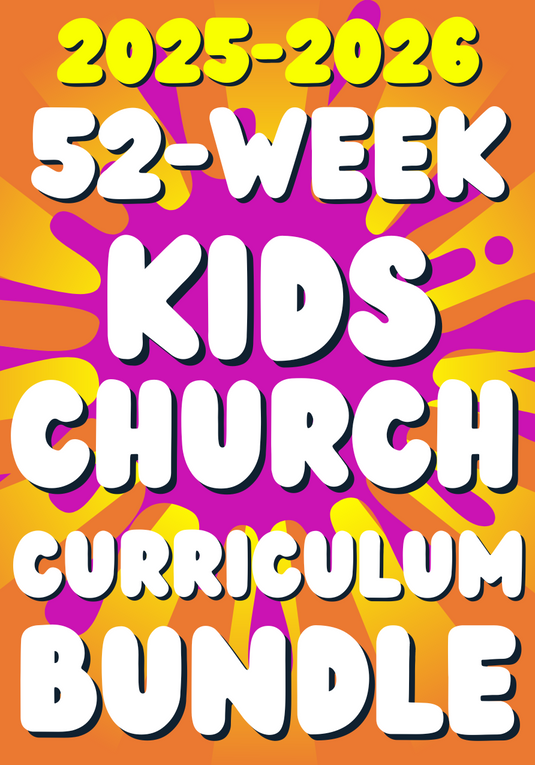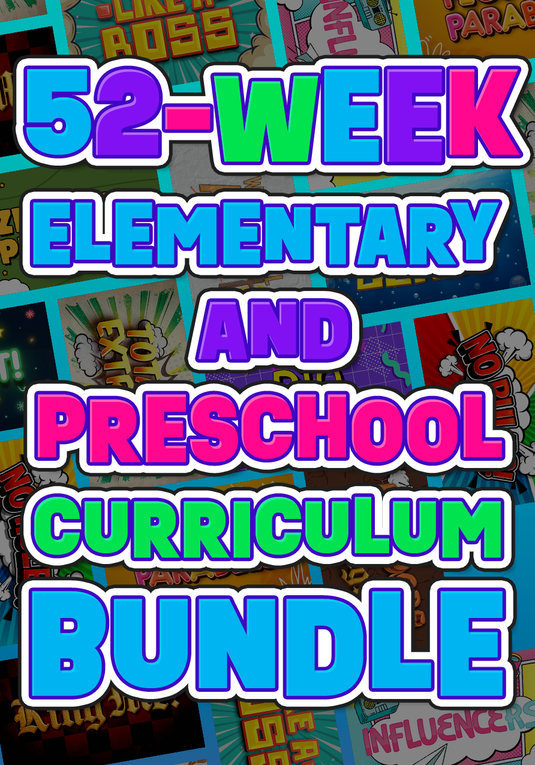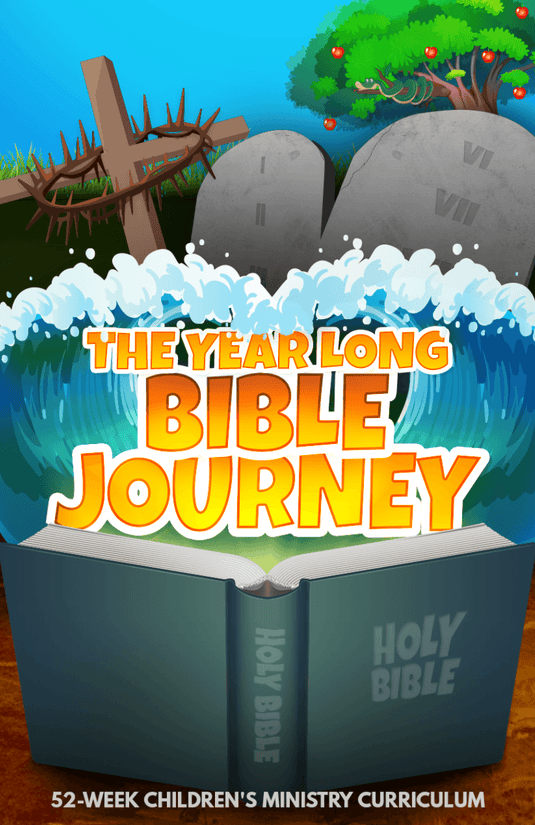Games should be a part of every children’s ministry, whether it be a Sunday School class, Children’s Church, or other special event you host. Kids need to move around, they need to be engaged, and they need to have fun. However, games don’t have to be complicated. You can make the simplest, most common games have meaning and value when done correctly.
The following list provides six easy Bible games for kids that you can incorporate into your children’s ministry. With a few adjustments, these activities can be easily adapted into just about any lesson or topic you are teaching.

Table of contents
6 Easy Bible Games for Kids
Tag
Who doesn’t like a good old-fashioned game of tag? There’s quite possibly nothing simpler. You don’t need any supplies, just some space. It’s a great way for kids to get their wiggles and energy out. But don’t just run around without any point. Adapt it to whatever topic you’re teaching about. You need one person to be the tagger, and the other children to be the runners.
Here are a few ways to turn tag into a teaching opportunity. Most lessons have to do with good vs. bad (David vs Goliath, Esther vs Haman, Moses Vs Pharaoh). The tagger can represent the bad guy in the story. The other kids need to try not to get tagged. The tagger can also be a positive character. Teaching a lesson about Jesus as The Good Shepherd? Make the tagger be the shepherd, and the runners be sheep he is trying to catch. How about Noah’s ark? The tagger can be Noah, and the runners can all be the animals he is trying to wrangle onto the boat.
Simon Says
Simon Says is another very easy game that many kids will have already learned how to play. It takes one leader and as many followers as you want. No supplies are needed, and you don’t even need very much space. Just have kids stand facing you so they can listen and watch for your instructions. Simon Says can be a quick activity when you need a time filler or are waiting for parents to pick up.
Just as with Tag, turn this simple game into a meaningful one. Simply change the leader’s name from Simon to the name of the Bible character you are studying:
- If you’re teaching about one of Paul’s missionary journeys, make the game Paul Says.
- Learning about how Moses was a leader? Use Moses Says for the title.
- Teaching that the prophets who had messages for God’s people to listen to and obey lends itself to a good game of Elijah Says.
Telephone
The classic game Telephone has been around for years, making it a great one to pull out. It brings fun and laughter with usually goofy and hilarious, messed-up messages. Keeping with the simplicity factor, there are no supplies needed.
How to Play
This activity can be adapted to play with any teaching topic. Come up with some phrases ahead of time that you want to stick with the kids.
Line them up and whisper a phrase into the first child’s ear.
That child will then whisper what they heard to the next child.
The passing along of the message will continue until finally the last person speaks the message aloud.
You could add the option of saying “operator” if a child needs the message repeated. It’s fun to see if and how the message changes from the beginning to the end.
Telephone lends itself nicely to lessons on the prophets or stories of messages being delivered:
- Jonah had a message for the people of Nineveh that had to be shared.
- Mary, Joseph, and the shepherds all received messages from angels.
- Etc.
Those are great times to play this game.
Generically speaking, you could also lead this activity when you want to work on a memory verse or just pass along some basic truths you want kids to remember. Some examples are: God loves me no matter what, Jesus came to die for me, or I can choose to do the right thing.
Relay Race
Kids like the thrill of a race or competition. Relays can accomplish this during your Children’s Ministry time.
How to Play
Once again, this can be a very versatile activity. Normally, you would divide kids into two teams.
Place the teams on one side of the room and their goals on the opposite side.
The first child from each team will run down, perform their task at the opposite end, and then run back, tagging the next child in line.
The team that finishes first wins.
You could also create a relay with just one team, so everyone works together to achieve the goal. Another fun component to add is to time the team(s) to see how quickly they can finish the task.
Adapt Your Relay to Your Lesson
- If you’re teaching about the Armor of God, make the goal for each child to put on a piece of armor or clothing when they run to the opposite side of the room.
- If you’re teaching about Jesus calming the storm, have each child bring a cup of water down to the other end to fill up a bucket.
- Palm Sunday would be a great opportunity for a horse relay activity where kids can pretend to be Jesus riding a stick horse from one side of the room to the other.
The Floor Is Lava
For years, kids have played some version of this game. Move off the floor because the ground is hot, or something is going to get you. Recently, The Floor is Lava has even been made into a TV game show.
This activity uses no supplies and can be modified in many different ways. All you need is a safe spot with some space. Basically, the kids will be walking or running around (or skipping or jumping or whatever action you decide to have them do). As soon as the leader shouts, “The floor is lava!” kids will run to the designated safe spot. This might be a taped-off area in your room, carpet squares, or chairs.
Turn this hyped-up game into a Biblical one by focusing on the idea of turning to God for safety. More specifically, you could use this game when talking about the temptations that Jesus endured. Every time Satan tried to lure Him, Jesus went to the safe spot of scripture. So the safe spot could be Scripture, and when the leader shouts “temptation!” the kids run to Scripture.
This can also really reinforce the lesson of building on a firm foundation. When the leader shouts, “A storm is coming!” kids have to run to the firm foundation for safety. You could also incorporate this game when teaching about the 10 Plagues. Shout out a plague like “locusts” or “frogs” and have kids run to the designated area.
Popcorn
Popcorn is an easy game to play for a little or a long while. It can be done anywhere and with any lesson.
How to Play
Determine your topic and share it with your group of kids. They will then take turns listing words or names that go along with that topic. There’s no specific order; kids will just randomly call out answers. That’s why it’s called popcorn. You could change it up by sitting in a circle and having kids go in order. If they can’t come up with an answer within three seconds, they are out of the game.
Here are some examples for further explanation. Your topic could be the Books of the Bible. So, kids can shout those out one at a time, “Genesis, Isaiah, John, Titus…” until no one else can come up with an answer. Some more topical ideas are women in the Bible, the 10 commandments, Jesus’ disciples, and the miracles of Jesus.
If you have a big enough space and enough kids, you could have teams compete to see who could come up with the most answers in a designated time period. This game is helpful to have a whiteboard or at least a piece of paper to write down the answers on.
Keep the Game Room Stocked
Games are a necessary part of lessons. You can’t expect kids to sit and listen to you talk for an hour. Keep it fun! Let them get up and move around. When you take a simple game with few or no supplies and easy instructions, and give it meaning, it can become a part of the lesson that will help kids remember the bottom line and basic points of your teaching.
These six games are meant to be flexible. You can use them for a variety of group sizes. They can be adapted to just about any topic you are teaching on. They involve thinking, movement, and fun. So, be sure to include Bible games in all of your Children’s Ministry lessons.
Having easy activities like these in your back pocket can liven up your time, get heart rates up, and help your students better remember the main point you’re trying to get across.
Additional Resources
Pin This Lesson for Later!

Frequently Asked Questions
1. How can I use games to reinforce memory verses or Bible truths?
Integrate key phrases or verses into game mechanics. For example, use the game “Telephone” to pass a memory verse or Bible truth from one child to another to see how well the message stays intact.
Create repetition through play. Games like “Popcorn” can prompt kids to repeat truths like “God is love” or list books of the Bible, reinforcing learning through repetition.
Tie physical actions to concepts. Use actions in games like “Simon Says” or “Relay Race” to act out Bible truths (e.g., “Paul says: Share with others” or “Put on the armor of God”).
2. How do games help children remember the lesson?
Engagement boosts retention. Physical activity stimulates the brain and body, helping kids internalize the lesson by associating movement with meaning. Meanwhile, fun, laughter, and teamwork create positive emotional memories, making the lesson more likely to stick.
And by repeating the same truth or theme in different games, children encounter the concept multiple times in fresh ways.
3. How long should each Bible game last during a typical Sunday School session?
5–10 minutes for quick games or transitions: Use short games like “Simon Says” or “Popcorn” as fillers or to reinforce lessons without derailing the main focus.
10–15 minutes for lesson-themed games: For games that are directly tied to the Bible story or memory verse, this timeframe allows for deeper engagement and context.
Adjust based on group size and energy level: Be flexible—if kids are engaged and learning, extend it slightly. If focus drops off, wrap it up and move on to the next activity.
4. How do I ensure games don’t become too competitive or exclude shy children?
Focus on cooperative goals. Use non-elimination or group-based activities where everyone contributes toward a shared goal (e.g., team relay or “fill the bucket” challenge).
Rotate roles and provide encouragement. Give shy or hesitant kids low-pressure roles first (like timekeeper or helper), then gradually increase participation as they build confidence.
Finally, emphasize participation over winning. Set the tone by praising effort, creativity, or teamwork instead of speed or being first. Reinforce that the goal is learning, not just winning.







